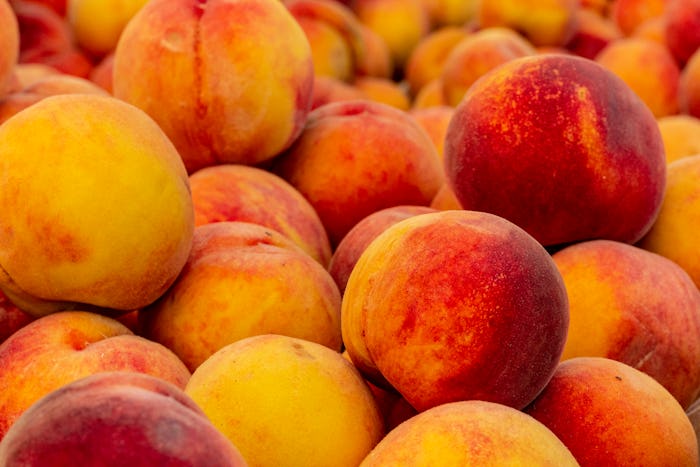News

There's Now A Recall On Peaches Sold At Target, Walmart, & More Due To Salmonella
Close that cookbook and save that peach cobbler recipe for another rainy day. This week, the Centers for Disease Control and Prevention (CDC) announced a voluntary recall on peaches across the United States due to concerns the summer fruit may be contaminated with salmonella.
According to the CDC, 68 cases of salmonella poisoning and 14 hospitalizations have been linked to peaches from California-based produce supplier Prima Wawona. "We’re conducting this voluntary recall in cooperation with the FDA out of consideration for the well being and safety of our customers and consumers. We continue to be committed to serving consumers with high quality fruit," Wawona Vice President of Technical Operations George Nicolich said in a statement.
The recalled fruit was sold at major retailers and grocery stores like Target, Kroger, Sam's Club, Food Lion, Walmart, Aldi, Hannaford, and Wegmans.
Peaches included in this recall were sold individually and in bags under different brand names between June 1 and Aug. 19. Those packaged in bags were sold under the following brands: Wawona Peaches; Wawona Organic Peaches; Prima Peaches; Organic Marketside Peaches; Kroger Peaches; and Wegmans Peaches.
Loose peaches that weren't sold in a prepackaged bag included in this recall may have a sticker with a PLU code, which you can find here, that can indicate if your fruit should be tossed. However, the CDC notes that "not all peaches with these PLU codes are supplied by Prima Wawona," so if you are unsure of the origin of your peaches, just throw them out.
According to the CDC, the salmonella outbreaks and hospitalizations connected to the recall of Wawona peaches have so far been reported in nine states: Iowa; Maryland; Michigan; Minnesota; New Jersey; New York; Pennsylvania; Virginia; and Wisconsin.
Salmonella poisoning can cause symptoms like diarrhea, stomach cramps, and fever anywhere from six hours to six days after infection, the CDC explains. Symptoms can last up to seven days, although it can sometimes be more severe for children younger than 5, adults older than 65, and those with weakened immune systems.
While the Food and Drug Administration (FDA) is currently investigating the multistate salmonella outbreak along with other government agencies, Cornell University professor of food safety Martin Wiedmann told The New York Times that it can be difficult to trace the source of contamination. "The challenge with salmonella is salmonella can really enter or contaminate food almost anywhere in the whole chain," Wiedmann told the newspaper. "It could start from a field or an orchard, where salmonella could be introduced. It could be in a facility where the product is packaged. It could be from a human who carries salmonella."
If you are concerned that your peaches could be part of this recall, check the product codes here. And if you have any other questions, you can contact Prima Wawona’s toll-free number at 1-877-722-7554, from 8 a.m. to 5 p.m. ET, Monday through Friday, or visit its website at wawonapacking.com